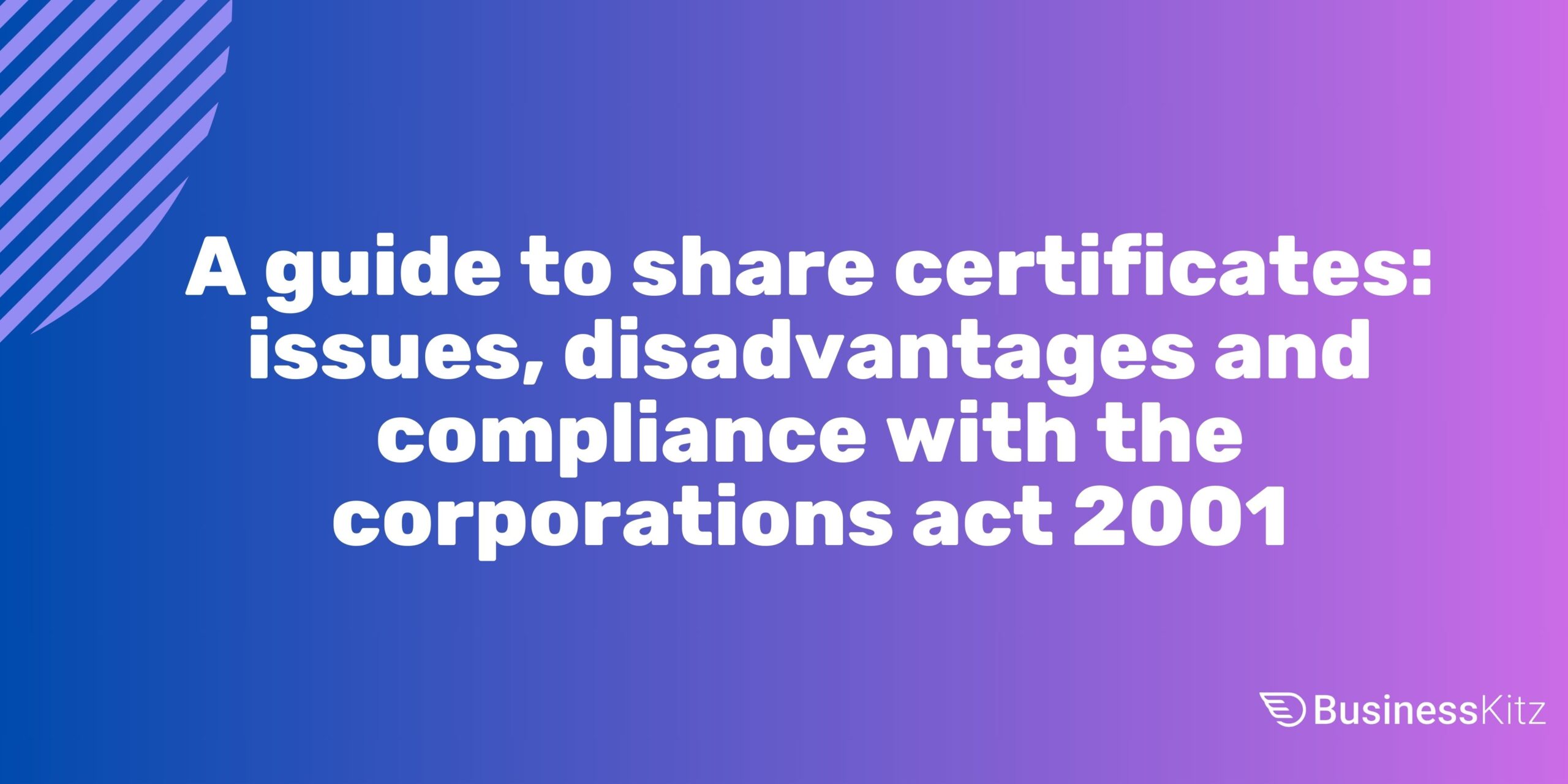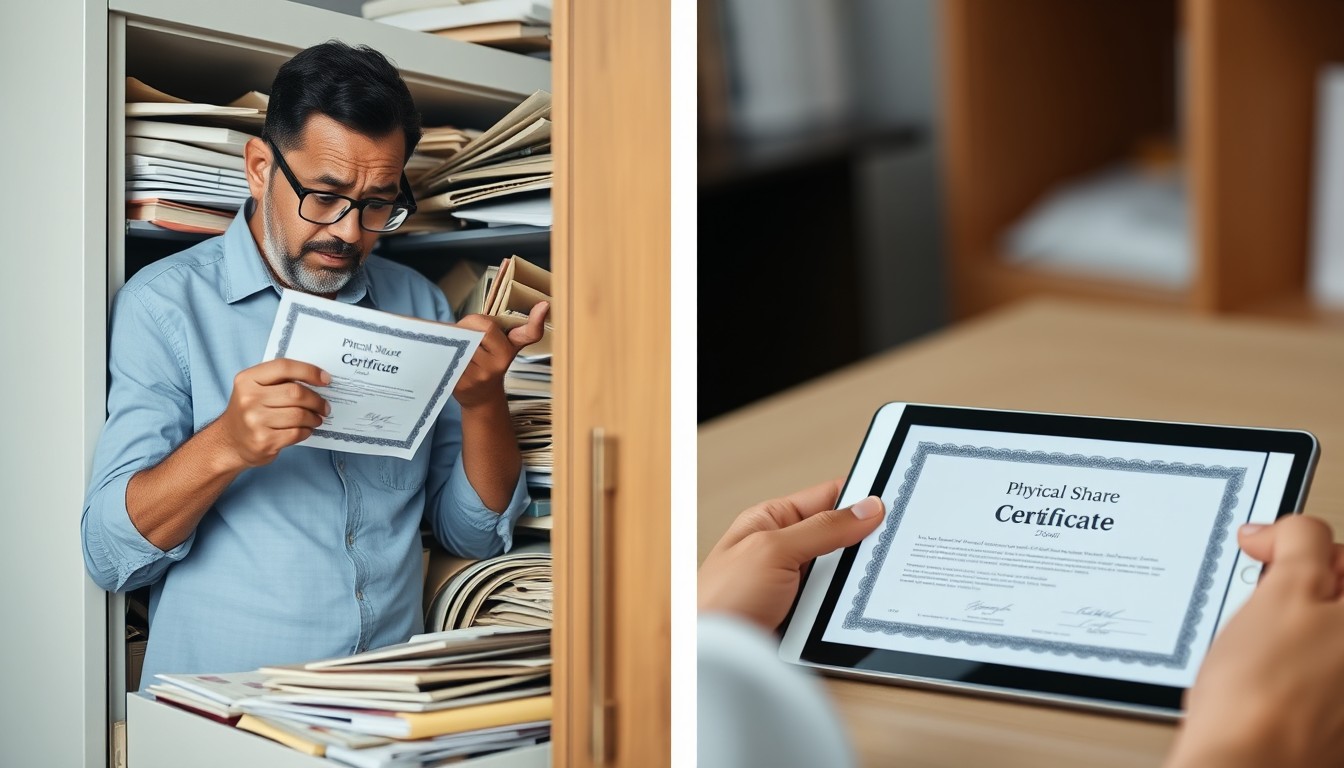
We've helped businesses save $55m with our all-in-one platform. Get instant access to this template and 115+ others, plus AI-powered document creation, starting completely free.
A share certificate is an important document that proves ownership of shares in a company. It confirms the shareholder's rights to those shares, such as voting and receiving dividends. Understanding how share certificates work is crucial for both businesses and shareholders. This guide explains the significance of share certificates and why keeping accurate records matters for smooth company operations and legal compliance.[ez-toc]
A share certificate is a document that confirms a person’s ownership of shares in a company. It details the shareholder's name, the number of shares held, and the company's name. Share certificates grant certain rights, such as voting and receiving dividends. Businesses issue these certificates during share allotments, transfers, or purchases, ensuring legal proof of ownership.
A share certificate is a document issued by a company to confirm that someone owns shares in that company. It serves as proof of ownership and is typically issued after a shareholder purchases or is allocated shares.This certificate holds importance because it proves your legal right to the shares. It indicates the number of shares owned, the class of shares, and other details like the shareholder's name and the company’s name.For businesses, understanding share certificates is crucial. It helps ensure that the share register is accurate and up-to-date. If you hold shares in a company, the certificate guarantees your rights to vote at meetings and receive dividends, depending on the class of shares you hold.For shareholders, having a share certificate is a vital document. It provides legal proof of ownership and can be used to transfer shares or claim dividends. It also plays a role when investors want to sell or transfer their shares.In summary, share certificates are a fundamental aspect of ownership, security, and legal rights for both businesses and shareholders. Understanding how they work is crucial to protecting your investment and ensuring you receive all entitled benefits.

A share certificate is a document issued by a company that confirms the ownership of shares. It serves as proof that you hold a specified number of shares in the company.
A share certificate acts as a legal record of ownership. It grants the shareholder certain rights, such as the ability to vote at company meetings and receive dividends. These rights are tied to the specific shares listed on the certificate.Share certificates are important because they validate your claim to the company’s shares and ensure you can exercise the rights associated with those shares. Without a certificate, proving ownership can become difficult, especially if there are issues like share transfer or dividend disputes.In essence, a share certificate is a crucial document that solidifies your status as a shareholder and supports your legal rights within the company.
A share certificate is issued through a clear process. The company follows a series of steps to register shareholder details, complete the necessary documentation, and meet all legal requirements.
It’s the company’s responsibility to maintain an accurate and up-to-date shareholder register. This is crucial for managing share ownership records and facilitating the issue of share certificates. The company can issue either physical or digital certificates, depending on their policy and system.
Issuing share certificates correctly and on time is essential for smooth operations and legal compliance.
A share certificate is issued during specific events, such as when shares are purchased, transferred, or as part of the share issue process. These events can occur at different points in a company’s life cycle.
Here’s a table summarising common share issuance events:EventCertificate issuedInitial allotmentUpon company registrationShare transfer or purchaseAfter the transactionCompany expansion or share increaseWhen additional shares are issuedThese events mark the official moments when shareholders receive proof of their ownership.

Losing or damaging a share certificate can complicate matters, but it is possible to resolve the situation through a simple reissue process.
If a share certificate is lost or damaged, the first step is to notify the company. Inform them of the situation as soon as possible. The company will then guide you through the process of obtaining a replacement certificate. This often requires submitting a formal request along with specific documentation.
When requesting a replacement certificate, you may need to provide an affidavit. This is a sworn statement that explains the circumstances of the loss or damage. Additional documentation, such as proof of identity and shareholder details, may also be required to ensure the reissue is valid.
Losing or damaging a share certificate can lead to complications. One major issue is the impact on the shareholder register. If the company is not updated with accurate details, this could cause delays in share transfers or payment of dividends. Without the proper certificate, it may also be harder to prove ownership when making decisions or participating in voting.It’s important to handle share certificates carefully to avoid such challenges.
Physical share certificates come with several risks that could cause issues for both shareholders and companies.
Holding a physical share certificate can lead to problems like loss or damage. If the certificate is lost, it may cause delays in transferring or selling shares. It may also complicate dividend payments. Furthermore, physical certificates are vulnerable to theft or accidental damage.
Physical certificates can make the transfer of shares more complicated. Each time shares are sold or transferred, the certificate must be physically exchanged. This process can be slow and cumbersome, especially if the shareholder lives far away or if the certificate is damaged.
To avoid these risks, many companies now issue digital share certificates. These certificates are stored electronically, making them easier to manage and transfer. They reduce the risks of loss or damage and can be accessed quickly.Secure digital registers also offer an added level of protection. Companies can store shareholding records digitally, ensuring that they are accurate and up to date.
Switching to digital certificates can streamline the process, enhance security, and make it easier to manage shareholding.
A share certificate is closely tied to the company’s shareholder register. The register records each shareholder’s details, including the number of shares they own. The certificate acts as a formal proof of ownership in the company, linking the shareholder to their shares as listed in the register.
Companies are legally required to maintain an accurate shareholder register. This register must be updated regularly, especially when new shares are issued, or shares are transferred. The shareholder register ensures that all shareholder details are kept current, which is essential for shareholder rights, including voting and receiving dividends. To be clear of the legal obligations speak to a legal professional.
Companies must notify both ASIC and shareholders when there are any changes to the shareholder register. This can include changes like a new shareholder, share transfers, or updates to shareholder details. These updates must be filed with ASIC within specific timeframes. Failure to do so can result in penalties.Timely updates are crucial to ensure that all parties involved are correctly informed. Keeping the register up to date also helps companies comply with the Corporations Act and maintain smooth operations.

Updating company details and share certificate information is essential for maintaining compliance with regulations. Companies must notify ASIC and update their records when there are changes to shareholder details or share transactions.
There are specific instances when a company must notify ASIC of changes:
Failing to update ASIC or the shareholder register can lead to serious consequences. Companies risk facing penalties for not filing the required changes within the correct timeframe. Inaccurate records can cause delays in issuing share certificates, transferring shares, or paying dividends. These mistakes can also complicate legal matters, shareholder disputes, and tax obligations.Ensuring timely updates helps the company stay compliant with the Corporations Act and avoids operational disruptions. By notifying ASIC promptly, the company can ensure its shareholder records are always current and legally binding.Change in detailsTimeline for notificationChange in shareholder detailsWithin 28 daysTransfer of sharesBefore transferCompany’s registered addressWithin 14 days
ASIC (Australian Securities and Investments Commission) plays a key role in regulating company records and ensuring compliance with laws regarding share certificates. Companies must comply with the Corporations Act, which includes accurate record-keeping and issuing share certificates to shareholders.
ASIC requires companies to maintain accurate and up-to-date shareholder registers. Share certificates must be part of these records. If a company fails to comply with these obligations, it may face penalties. Share certificates must be issued in accordance with ASIC regulations to ensure they meet legal standards.
Companies that do not issue share certificates on time or fail to update shareholder records as required may face legal consequences. ASIC may impose penalties for non-compliance, which can impact a company’s operations and reputation. It’s crucial for businesses to stay updated with regulations to avoid legal and financial risks.ASIC ensures that companies follow the rules, providing legal protection for shareholders and the business. Staying compliant with ASIC regulations helps maintain proper shareholder records and secure share ownership.
A share certificate is a document issued by the company that confirms you are the owner of a certain number of shares. It shows the amount paid, the shares owned, and voting rights. A share certificate may be issued on behalf of the company, and it complies with the relevant provisions of the Companies Act.
In today’s digital world, many companies provide a platform to download your share certificate electronically. After completing the transaction, you may qualify for an e-signature or digital certificate, which is easier to store than a physical one. To access our full library of documents and legal templates you can sign up for free here.
You typically receive a share certificate when you buy or transfer shares. The company issues the certificate after you invest and confirm the transaction. Depending on the company’s process, the certificate will indicate the respective number of shares you own.
If you lose your share certificate or it gets damaged, you should notify the company immediately. You may be required to provide a receipt of the original certificate and request certification to issue a new one. In some cases, you will need to submit an affidavit to confirm the loss or damage.
Yes, a share certificate may be issued to another person if the ownership is transferred. The transfer of shares must be recorded properly. The transfer should be signed on behalf of the owner, and the appropriate stamp duty may be applied.
Digital share certificates are common these days. They’re easier to store and less likely to be lost or damaged. These certificates are issued electronically, reducing the risk of theft or damage compared to a physical share certificate.
Yes, the shares owned are used to calculate capital gains tax when you sell them. The amount of money received from the sale is considered in your taxation, based on the price you paid and the price when you sell.
The timing can vary depending on the company. Once the shares are issued, the certificate is typically provided within two months. Always seek advice if you are unsure about the timeline for receiving your certificate.
If the share certificate contains an error, contact the company immediately. They may ask you to provide details or a sheet to certify the correct information. The company secretary will help ensure that the necessary adjustments are made according to the applicable provisions.
Yes, share transfers can occur without the need for a physical share certificate. Digital systems make it easier to track share ownership. However, the transaction must comply with relevant regulations and may require certification.
Share certificates are vital for both businesses and shareholders. They serve as legal proof of ownership and secure shareholder rights. Keeping accurate records is crucial to meet legal requirements and avoid penalties. Companies must ensure they issue share certificates properly and maintain updated shareholder registers to stay compliant with ASIC regulations. By doing so, they protect their operations and shareholders’ interests while avoiding costly legal issues.At Business Kitz, you can get access to compliance items to help your business needs. For a 150+ documents and legal templates, digital signing and more sign up for free here.
Disclaimer: This content is intended to be used for educational and informational purposes only. Business Kitz does not offer legal advice and cannot guarantee the accuracy, reliability, or suitability of its website content for a particular purpose. We encourage you to seek professional advice from a licensed professional and verify statements before relying on them. We are not responsible for any legal actions or decisions made based on the information provided on our website.
Unless expressly stated otherwise, all content, materials, text, images, videos and other media on this website and its contents are the property of their respective copyright owners.
Copyright © 2025 Business Kitz 14312161